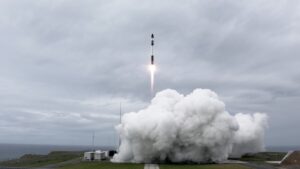Rocket Lab launches 10 imaging smallsats
By Jeff Foust

WASHINGTON — A Rocket Lab Electron rocket successfully placed 10 satellites into orbit for two customers who lost payloads on a launch failure earlier this year.
The Electron rocket lifted off from the company’s launch site on New Zealand’s Mahia Peninsula at 5:21 p.m. Eastern Oct. 28. The rocket’s kick stage deployed its payload of 10 satellites into a 500-kilometer sun-synchronous orbit about an hour later.
The primary payload on the launch, called “In Focus” by Rocket Lab, was a set of nine SuperDove cubesats for Planet, augmenting that company’s constellation of imaging satellites. The other payload was CE-SAT-2B, an imaging microsatellite developed by Canon Electronics as a technology demonstration for future satellites and whose flight was arranged by launch services company Spaceflight.
Both Planet and Canon had payloads on Rocket Lab’s Electron launch failure in July, which also carried a satellite for British company In-Space Missions. Rocket Lab blamed that failure on an “anomalous electrical connection” in the rocket’s upper stage that had slipped through quality control checks, and the company returned the Electron to flight Aug. 30 with the launch of a synthetic aperture radar satellite for Capella Space.
“Electron has once again delivered a smooth ride to orbit and precise deployment for our individual rideshare customers,” Peter Beck, chief executive of Rocket Lab, said in a statement after the launch.
The launch was the 15th flight of the Electron. Rocket Lab said in its statement that the next Electron launch will take place “in the coming weeks” from New Zealand. The company also has an Electron waiting for launch at its new Launch Complex 2 on Wallops Island, Virginia, but has not disclosed a date for that launch.
The launch, like others by the U.S.-headquartered Rocket Lab, was licensed by the Federal Aviation Administration. During an Oct. 27 panel discussion at the American Astronautical Society’s Wernher von Braun Memorial Symposium, Wayne Monteith, associate administrator for commercial space transportation at the FAA, noted that the Rocket Lab launch would set a record for the most FAA-licensed launches in a month at six. The other launches in October include three SpaceX Falcon 9 launches, a Northrop Grumman Antares launch and a suborbital launch by Blue Origin’s New Shepard.
The previous record of five licensed launches in a month was set just two months earlier. August also saw three Falcon 9 launches and an Electron launch, along with a “hop” test of a SpaceX Starship prototype performed under an FAA license.
Both records are signs of surging commercial launch activity, Monteith argued. “We have already in the FAA licensed more launches in this fiscal year than we did in fiscal year ’09, ’10, ’11 or ’12,” he said. The current fiscal year started Oct. 1.
October 29, 2020 at 01:23PM
via SpaceNews read more...

Post a Comment